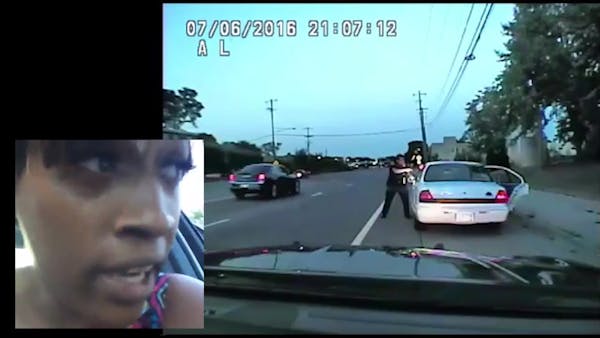The day after officer Jeronimo Yanez shot and killed Philando Castile during a traffic stop on July 6, 2016, state investigators began filing search warrants in the case. They obtained cellphones, tried to search through social media accounts, even files stored on iCloud. They wanted to track who was where in the days leading up to the shooting.
Most of those searches were of Castile, as well as of Diamond Reynolds, his girlfriend in the car with him that night who livestreamed the shooting's aftermath on Facebook.
The warrants are among nearly 2,200 of pages of evidence released by the Minnesota Bureau of Criminal Apprehension Tuesday after a Ramsey County jury found Yanez, a St. Anthony police officer, not guilty of felony manslaughter and reckless discharge of a firearm.
The search warrants offer a revealing glimpse at how authorities conducted the investigation in the initial days, and how thoroughly they looked into social media accounts and cellphone records after the shooting.
It is not unusual for police to try to find out anything they can about those involved in a case like this, said Michael Quinn, a retired Minneapolis police sergeant. "If you're a prosecutor, you would want to know everything [defense attorneys] would know," he said.
But he was perplexed that investigators didn't do the same searches on Yanez.
"You would think they would want to know everything on him," Quinn said.
BCA spokesman Bruce Gordon said Friday that the agency searched for Castile and Reynolds' phone and social accounts because "it was important for us to obtain every image available that may have captured the incident, those events that led to it and those that immediately followed."
He declined to say why the same wasn't done for Yanez.
The BCA conducted the searches over repeated protests by Reynolds' attorney, Larry Rogers. In a letter he sent to the BCA in July, he called the BCA's searches "fishing expeditions" and demanded that the agency return her phone to her.
In an interview Friday, Rogers said it is not unusual for investigators to do such a thorough examination in police shooting cases.
"What happens in these shootings is that family and witnesses become further victimized and scrutinized, and their privacy is invaded," Rogers said. "It's a system that should treat officers the same way in the crime."
Facebook searches
In total, judges signed off on at least seven search warrants requested by the BCA on Castile and Reynolds.
The day after Castile was killed, the BCA got a warrant to go through his car and phone, and a day later for Reynolds' phone, examining the device as well as all of her incoming and outgoing calls for several days before the shooting.
On July 8, they sent a warrant to Facebook to view the couple's Facebook accounts, and to make sure it was done without Reynolds' knowledge.
"Your Affiant is aware through training and experience that individuals frequently call and/or text messages to each other regarding criminal activity during and/or after and event has occurred," a BCA investigator wrote in his request. "Analysis of text messages and chats regarding the individuals involved in this incident may in fact assist in corroborating or refuting statements made by the individual involved in this investigation."
Facebook told the BCA it would comply with the warrant, but would not allow the search to be done in secret. Gavin Corn, a general counsel for Facebook, told the BCA that the request for secrecy was unwarranted as "the investigation is public and the data has been preserved."
On July 20, the BCA told Facebook it would no longer pursue the warrants. But other companies complied and provided information in secret.
Apple provided information from Reynolds' iCloud account following a July 14 warrant as BCA agents searched for "videos and photos" before and during the shooting, according to the court request.
They received Castile's iCloud information July 26, then on Aug. 11 received more data on who accessed his account after he died.
On Aug. 1, the BCA got records from Castile's cellphone provider to determine his whereabouts before the shooting. They wanted to see if he was potentially a suspect from a May 22 traffic stop, then if he was near a gas station robbed July 2.
Those searches turned up nothing.
It wasn't until more than a month after the shooting, on Aug. 11, that the BCA got Yanez's phone records, "on the direction of the Ramsey County Attorney's office," according to the investigative file.
The BCA makes no mention in its investigation of following up on that information, but they continued to examine Reynolds and Castile.
On March 21, they received another search warrant to go through Reynolds' phone, after a profile of her in the Washington Post said she had recorded other traffic stops with Castile. (Reynolds later denied saying this to the Post). The agents found nothing.
Two weeks later, prosecutor Richard Dusterhoft directed the BCA to search through a state gang database to see if there were any entries for Castile. Again, nothing was found.
The Ramsey County Attorney's office did not respond to a request for comment.
Brandon Stahl • 612-673-4626

Want to share info with the Star Tribune? How to do it securely

'Safe recovery sites' would offer syringes, naloxone and more to people using drugs. The plan could be in peril.
New Minnesota GOP leaders seek peace with party's anti-establishment wing

Who is Republican Lisa Demuth, Minnesota's first House speaker of color?

